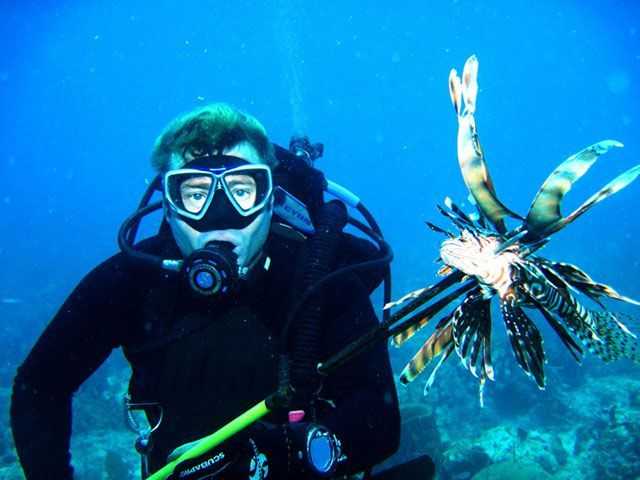
[dropcap]M[/dropcap]artin County’s Lionfish Program in conjunction with the Martin County Artificial (MCAC) Reef Fund will host a Lionfish Clinic and Hunt, on April 24th & 25th at the Loxahatchee River Center in Jupiter. This event will be geared towards education on why this species is a threat to our fragile ecosystem and will teach how to catch, prep and cook lionfish. On day two of the event, folks will have the opportunity to put their education to use as we go on a lionfish hunt. This event will kick off a month-long focus on lionfish and will conclude with the 5th annual Lionfish Round-Up on May 29th and 30th.
“It looks like the lionfish are here to stay,” says Kathy Fitzpatrick, Martin County’s Coastal Engineer. “Education and eradication efforts are currently the best defense we have against this species. We started this effort in 2011, when we became aware that this problem species was in our own front yard. Empowering our local users on the need to remove these fish is our best defense today.”
The clinic is designed for all age groups. There will be educational activities for the kids and for the adults, a more sophisticated education series including how to use gear, handle the fish from capture to filet, and how to prepare them to serve to family and friends. There will also be a lionfish tasting, arts and craft vendors and marine education exhibits. Folks can then decide if they want to go out and hunt these fish. We will be targeting both inshore and offshore site. Participants can venture out on their own or participate in one of our kayak, paddle board, offshore dive boats or free dive outings from the shoreline.
“This event was made possible by a grant from West Marine, to increase our lionfish removal efforts,” says John Burke, president of the MCAC Reef Fund. “We are excited to expand this effort and that our Lionfish Round-Up (May 29-30) has grown to be a stand-alone event which in the past was part of our Reef Builder’s Tournament in July.”
The River Center is located at 805 N. U.S. Highway 1 in Jupiter at Burt Reynolds Park.
This Round-Up helps fund the artificial reef program in Martin County. For more information visit www.mclionfish.com or call the Martin County Coastal Hotline, (772) 221-1387.
Lionfish Facts
- Lionfish (Pterois volitans and Peterois miles) are a venomous, spiny fish with a native habitat range in the Pacific and Indian Oceans.
- They are popular with aquarium enthusiasts around the world. It is likely these fish were introduced to the Atlantic via the aquarium trade or ballast tanks of transoceanic vessels.
- Lionfish are known to be highly territorial and can be found offshore or in estuaries. In Florida, lionfish have been found in all water depths; on hard bottom, mangrove, seagrass, coral and artificial reefs.
- These areas provide a perfect concentrated food source that is comprised of a wide variety of small fish (including economically important gamefish) and crustaceans (notably lobster, crabs and shrimp). They also furnish excellent structure and hiding areas from which the lionfish can ambush and corner prey with its large fins before swallowing it whole. Lionfish can consume prey over 50% of their own body size and expand their stomachs to 30 times their normal size.
- Reproduction can occur every 4 days with up to 30,000 eggs per spawn. The lionfish eggs hatch in just 2 days and settle on a reef within a month.
- Here in Florida, the lionfish has no known predators other than human beings and grow much larger than their native habitat. Impacts to reefs from the large numbers of lionfish, their voracious appetite for native reef dwellers and lack of natural predators can be swift and severe. The imbalance to the ecosystem and the impact to our economy make this an issue that touches everyone.